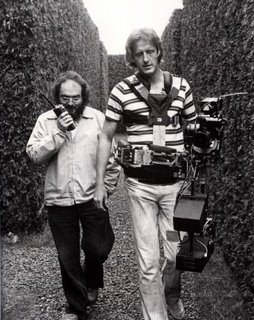
"is certainly the kindest person I ever met. For it is hard to be born in the Bronx and have the mentality of the neighborhood, so he tries to hide. Under this shell is a loving man and well-defined values \u200b\u200bthat you do not like pain and who can not bear to see people or animals suffering. I was very surprised. " Matthew Modine
 born on July 26, 1928 in Jewish family, upper middle class. Soon becomes a introverted child, dependent on his mother and lines Overall, a boy with freedoms s current character somewhat. His qualifications speak
born on July 26, 1928 in Jewish family, upper middle class. Soon becomes a introverted child, dependent on his mother and lines Overall, a boy with freedoms s current character somewhat. His qualifications speak a mediocre student, not excel in any field. Only attracted to jazz, before their taste for photography and chess, elements that would be important to the final in his role as director. Tastes like each other, with more than one point in common.
 The same prison represented sitting at a chessboard or a battery in the back of a band of nine musicians. The look of a voyeur so behind the lens of a camera like a film camera.
The same prison represented sitting at a chessboard or a battery in the back of a band of nine musicians. The look of a voyeur so behind the lens of a camera like a film camera. The wait for the proper movement, infinite patience, pace and careful choice, the important background music. Traits that were shaping their beginnings and cement his vision of art.
In the solitary world of chess was ac tournament ompetir barria them for small amounts of money, saved hard.
 His father is the defining influences in his adolescence, their thirteen, with the gift of an old Graflex camera. His love of photography led him to the most prestigious journal of that time called Look . known data but not his brief stint as a drummer in a jazz band (prefer their music with the classic).
His father is the defining influences in his adolescence, their thirteen, with the gift of an old Graflex camera. His love of photography led him to the most prestigious journal of that time called Look . known data but not his brief stint as a drummer in a jazz band (prefer their music with the classic). This quickly brings prestige and a lot of money to finance themselves and their inevitable next step as a filmmaker.
His early shorts were funded with them, saving his father and unconditional friendship of his first great friend and then partner: J. Harris .
Four times between the years 1951-1953, three documentaries for television and a little-known episode. The rest is a familiar topic for all who love his films.
"Imagine a chess grandmaster who are just three minutes and ten movements. Spend two minutes on a single play because he knows that if he does well, you lose the game and tops the other nine strokes in a minute. And it may work. In film, you are faced with decisions as ta continuously. You're always comparing the time and resources to quality and ideas "
Stanley Kubrick

0 comments:
Post a Comment